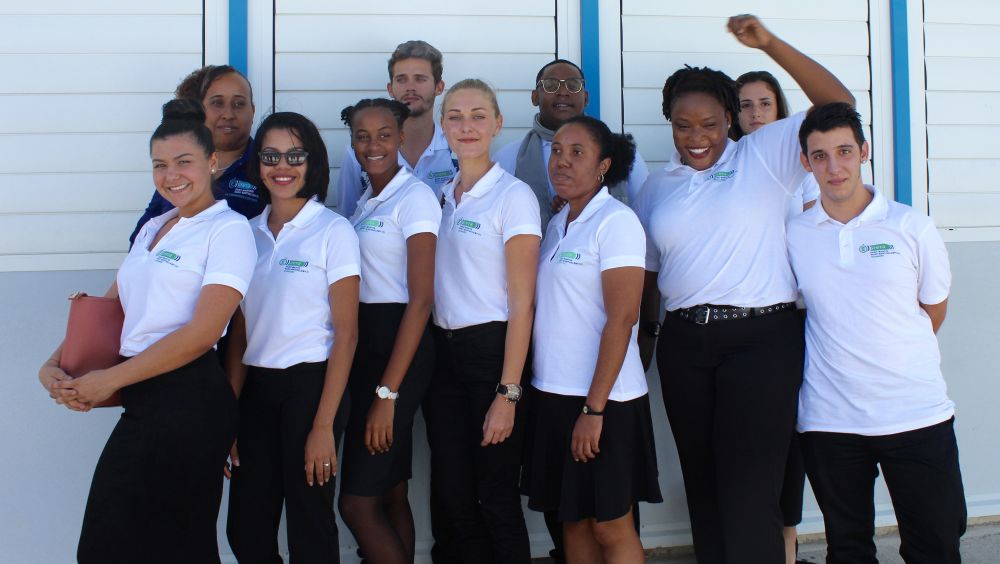The BTS diploma in Hospitality-Catering-Tourism has been launched
"My mother is a caterer, and I wanted to take on this challenge for her," says Katya, who earned her professional baccalaureate degree in administration in 2008, then worked in various areas followed by training as a security officer at Greta, before registering for the BTS in Hospitality-Catering Option A Marketing last summer, at her mother’s urging. Like her, the first class of BTS students, mostly women, each appeared before the press and the members of the steering committee with surprising ease. Their backgrounds are relatively different, with some who just got their baccalaureate degrees in Saint-Martin (general or professional in hospitality-food service), while others tried other career paths on the mainland or elsewhere and ultimately decided to return to the island.
TRAINING A HIGHLY QUALIFIED WORKFORCE
Encouraged by the President of the Republic during his visit to Saint-Martin in May 2015, the long-awaited BTS in Hospitality-Catering-Tourism was officially launched on Monday, December 5, in the annex to the Lycée des Iles du Nord. Even though classes began on November 21. The goal of this new training, given in three languages (French, English, and Spanish), is to train a highly qualified workforce, as noted by Michel Sanz, the head of the Department of Education, as a preamble to the launch meeting attended by the members of the steering committee (the Collectivité, the State, Greta, National Education, Ladom, the Hospitality Association) as well as two inspectors from the Academy of Guadeloupe (responsible for pedagogical sequencing and content).
Among around twenty applications received, only eleven were accepted based on a written application followed by an interview. Eighteen students would have better covered the costs, but the goal was not to saturate the market or risk putting faith in students who would not have gone the distance. Aside from a base of knowledge of the field and of languages, they were chosen based on their personality, their motivation, and their behaviors. “These are also personality-based careers," noted Philippe Thévenet, the representative of the Hospitality Association, arguing that they would need to meet customers and work in teams. "These are very difficult but gratifying careers," he guaranteed.
ALTERNATING BETWEEN THEORETICAL AND PRACTICAL TRAINING
Janine Hamlet, the principal of the professional high school and president of Greta, as well as the two inspectors selected the pedagogical team, supported by four instructors from the Lycée hotelier du Gosier (Guadeloupe).
The two-year training includes 33 weeks of theoretical courses given at the Greta Centre, and 39 weeks in a company (including an eight-week internship abroad), explained Roger Annerose, consultant to Greta and member of the technical committee for the project with Christophe Parisot.
The BTS is designed as a program in which students spend time learning both in companies and in the classroom. The 2016-2017 school year marks the beginning of a BTS specialized in Hospitality-Catering Option A Marketing. It will be followed in 2017-18 by the creation of the BTS in Hospitality-Catering Option B devoted to the culinary arts, and in 2018-2019 by the BTS in Tourism, which should coincide with the opening of a work-based applied bachelor’s degree (in French, “un diplôme de licence pro”) for BTS Option A graduates who wish to continue their studies. This format does not exist anywhere else, since it has been custom-created by the different partners based on the needs of the territory.
A UNIQUE, CUSTOM-MADE TRAINING
Other than Riu, which has already signed a professional training contract, several companies including the Esmeralda, the Samanna, the Grand Case Beach Club, and the Alamanda have committed to welcoming interns.
In order to ensure that students are in the most comfortable possible situation and are not laid off during their training, they receive compensation. The Collectivité is funding the materials and individual aid for the training, and the Employment Centre covers five students, while LADOM completes their salaries and covers all of the plane tickets for the foreign internships. Opcalia, which collects the professional tax, will pay for the theoretical training at Greta. Finally, the CCISM will guide the companies that are hosting interns. A long-term project, but also a team project. This is why Janine Hamlet wanted to place this BTS under the theme of perseverance and implored her students: "Stick with us!"








